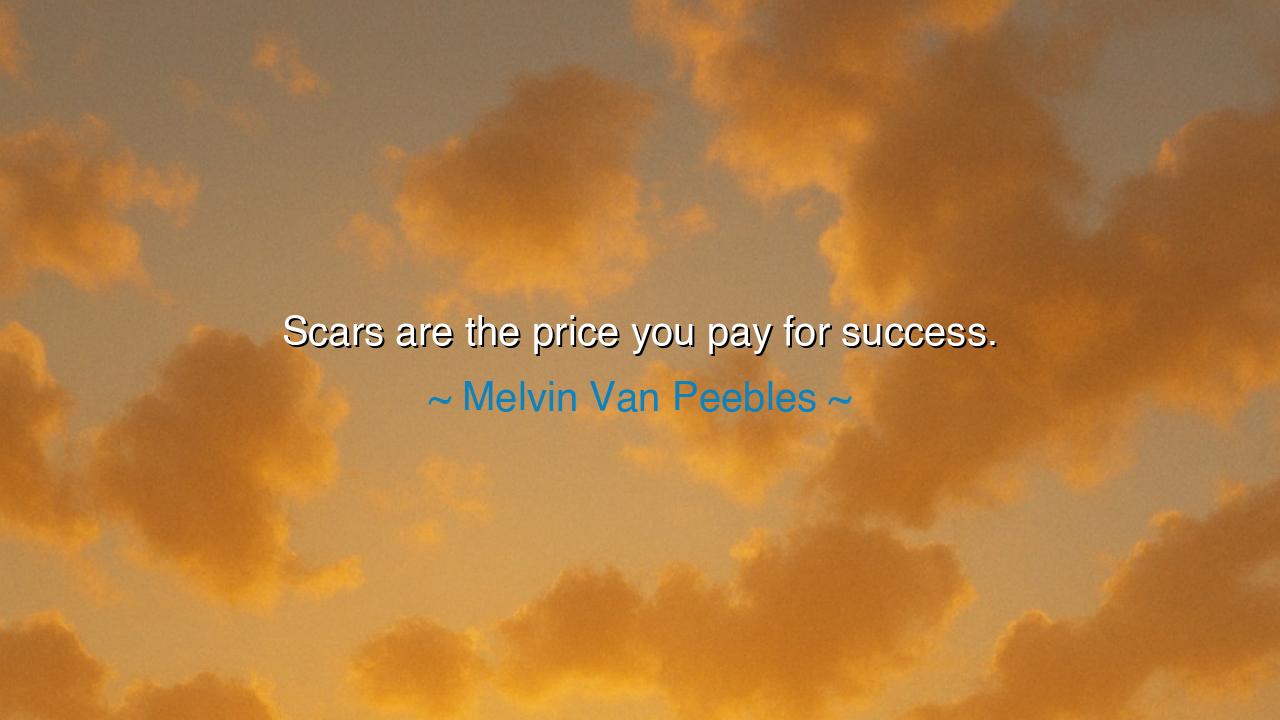
Scars are the price you pay for success.






The fearless filmmaker and visionary, Melvin Van Peebles, once spoke with the weight of one who had fought long battles: “Scars are the price you pay for success.” These words are carved not from theory, but from the living flesh of experience. For Van Peebles was a man who broke barriers in cinema, who endured rejection, poverty, and hostility, yet forged a legacy that redefined what was possible for Black artists in America. His quote is a truth passed down like an ancient proverb: greatness cannot be won without wounds, and success demands sacrifice written upon the body and the soul.
To speak of scars is to speak of memory. A scar is the remnant of pain overcome, the mark of a wound endured and healed. It is not the wound itself, but the proof that one survived it. Van Peebles’ wisdom reminds us that no triumph comes without such marks. Every leader, every artist, every fighter who has truly risen carries scars—some visible, some hidden. They are the currency of progress, the receipts of every battle fought against doubt, rejection, and resistance.
The imagery of paying a price is crucial. Success is never free. It is not handed down, nor granted without demand. The price may be long nights of exhaustion, the sting of betrayal, or the bitter taste of failure. But those who bear these scars emerge with a power that the unscarred can never know. They have not only achieved—they have endured. In this sense, scars are not shameful but sacred, proof of the cost willingly borne for a vision greater than comfort.
History is rich with such examples. Consider Frederick Douglass, who bore the literal scars of the whip as a slave, and yet transformed those wounds into words that ignited hearts and shook nations. Or think of Harriet Tubman, whose head injury left her with lifelong pain and visions, yet she turned her suffering into strength, guiding countless souls through the dark path to freedom. Their scars were not only reminders of suffering—they were the very price that purchased their place in history.
Even in the realm of art, we see this truth. Vincent van Gogh lived in poverty, misunderstood and broken in spirit, bearing scars of the mind and heart. Yet from that torment sprang paintings of eternal light and color, works that the world would one day treasure beyond gold. His scars bought him no comfort in life, but they purchased immortality in art. So too with Melvin Van Peebles, who endured rejection from Hollywood, scraped together funds to make his own films, and bore the scars of isolation and struggle—but in paying that price, he opened the door for generations to follow.
The lesson, then, is clear: do not flee from scars, but understand their necessity. If you would achieve, you must be willing to endure. If you would stand victorious, you must accept that wounds will come, and that they will change you. Do not despise the marks they leave, for they are the signature of your perseverance, the autograph of your endurance upon your own flesh.
Practically, this means: embrace your struggles as part of the path. Do not hide your scars—whether failures, losses, or rejections—but wear them as medals of honor. When hardship comes, remind yourself: this is the price, and by paying it, I am purchasing something greater than ease. Let your scars teach you, strengthen you, and remind you that you are capable of surviving what once seemed impossible.
So let Melvin Van Peebles’ words endure: “Scars are the price you pay for success.” For every mark is proof of battle, every wound a stepping stone, every scar a seal of authenticity. Success without scars is illusion; true success is written on the body and soul of the one who dared to strive, who dared to endure, and who dared to win.






AAdministratorAdministrator
Welcome, honored guests. Please leave a comment, we will respond soon